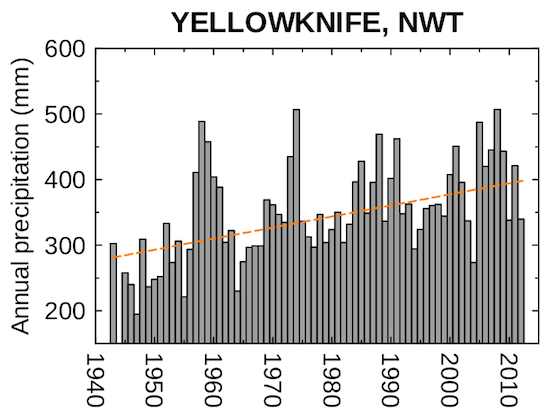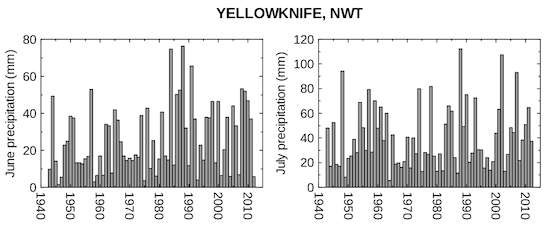By Sierra Rayne ——Bio and Archives--July 14, 2014
Global Warming-Energy-Environment | CFP Comments | Reader Friendly | Subscribe | Email Us
 I know what you're thinking. It must be precipitation during spring and/or summer that are declining, and this is leading to increasing numbers of summertime "tornadoes of fire." Nope. There are statistically significant trends towards more precipitation in both of these seasons since records began. In short, the area around Yellowknife has gotten much, much wetter since the 1940s (including and especially during the summer fire season), not drier. Since 1970 (i.e., the period during which the National Climate Assessment tells us climate change effects should be most pronounced), there have been no significant trends in annual, spring, or summer precipitation in the area.
Perhaps spring and/or summertime temperatures are getting hotter, and this increasing warmth is offsetting the large increases in precipitation? Nope. No significant trends in mean or mean maximum temperatures during spring or summer since 1970.
So it's not getting hotter or drier around Yellowknife over the past half-century or longer, and yet climate change is most certainly to blame for this year's forest fires in the region? Apparently an absence of correlation equals causation in climate science?
Perhaps the station at Yellowknife is an anomaly, and other stations in the NWT below the Arctic tree line (~69°N) are all showing drying and warming trends since 1970? Among the three other stations with consistent climate records since 1970 (Fort Simpson, Fort Smith, and Hay River), none have declining trends in either annual, spring, or summer precipitation over this period, and both Fort Simpson and Hay River have statistically significant increasing trends in annual precipitation since 1970. None of these other stations have significant increasing trends in spring or summertime mean maximum temperatures, either, and the only significant trends for mean temperatures are during summer at Fort Simpson and Fort Smith since 1970 -- but these trends become non-significant over the past quarter-century. Recall that anthropogenic greenhouse gas emissions have increased dramatically since 1990 -- so climate trends should be increasing in significance and magnitude over this time-frame, not moving towards an absence of trends (i.e., no climate change) as we see in the NWT.
In summary, the NWT is getting wetter over time, not drier, and fire season temperatures throughout the region are not increasing. Thus, what is the mechanism to directly link anthropogenic climate change to increasing risk from "tornadoes of fire" in this area?
Once again, I'll provide a quote from Dave Phillips -- a senior climatologist with Environment Canada -- on the subject:
"'It's just almost as if there's no weather around,' he says. 'We've seen, for example, in the last six weeks, precipitation in Yellowknife is only about 20 per cent of what it should be. You're just not seeing any rain.'"
So the lack of precipitation in June and early July in Yellowknife this year is the core problem. I see. Here are the historical records for precipitation at Yellowknife during these two months.
I know what you're thinking. It must be precipitation during spring and/or summer that are declining, and this is leading to increasing numbers of summertime "tornadoes of fire." Nope. There are statistically significant trends towards more precipitation in both of these seasons since records began. In short, the area around Yellowknife has gotten much, much wetter since the 1940s (including and especially during the summer fire season), not drier. Since 1970 (i.e., the period during which the National Climate Assessment tells us climate change effects should be most pronounced), there have been no significant trends in annual, spring, or summer precipitation in the area.
Perhaps spring and/or summertime temperatures are getting hotter, and this increasing warmth is offsetting the large increases in precipitation? Nope. No significant trends in mean or mean maximum temperatures during spring or summer since 1970.
So it's not getting hotter or drier around Yellowknife over the past half-century or longer, and yet climate change is most certainly to blame for this year's forest fires in the region? Apparently an absence of correlation equals causation in climate science?
Perhaps the station at Yellowknife is an anomaly, and other stations in the NWT below the Arctic tree line (~69°N) are all showing drying and warming trends since 1970? Among the three other stations with consistent climate records since 1970 (Fort Simpson, Fort Smith, and Hay River), none have declining trends in either annual, spring, or summer precipitation over this period, and both Fort Simpson and Hay River have statistically significant increasing trends in annual precipitation since 1970. None of these other stations have significant increasing trends in spring or summertime mean maximum temperatures, either, and the only significant trends for mean temperatures are during summer at Fort Simpson and Fort Smith since 1970 -- but these trends become non-significant over the past quarter-century. Recall that anthropogenic greenhouse gas emissions have increased dramatically since 1990 -- so climate trends should be increasing in significance and magnitude over this time-frame, not moving towards an absence of trends (i.e., no climate change) as we see in the NWT.
In summary, the NWT is getting wetter over time, not drier, and fire season temperatures throughout the region are not increasing. Thus, what is the mechanism to directly link anthropogenic climate change to increasing risk from "tornadoes of fire" in this area?
Once again, I'll provide a quote from Dave Phillips -- a senior climatologist with Environment Canada -- on the subject:
"'It's just almost as if there's no weather around,' he says. 'We've seen, for example, in the last six weeks, precipitation in Yellowknife is only about 20 per cent of what it should be. You're just not seeing any rain.'"
So the lack of precipitation in June and early July in Yellowknife this year is the core problem. I see. Here are the historical records for precipitation at Yellowknife during these two months.
 See any climate change induced trends towards less precipitation? Actually, there is a statistically significant increasing trend in June precipitation since 1943, and the correlation for July is positive -- not negative. The sum of June and July precipitation also has a statistically significant increasing trend since records began.
Got all that? A lack of precipitation in June and early July at Yellowknife is causing the forest fires, and despite the fact that there is a significant increasing trend in Yellowknife's precipitation during June and June plus July, this year's dry weather and resulting forest fires can somehow be unequivocally blamed on the same climate change that is actually making the summers wetter over time.
This June was also not the driest in Yellowknife's climate history. Only 1.4 mm of precipitation were received in June 1946, and only 3.0 mm in 1958, 3.6 mm in 1975, and 3.9 mm in 1993 -- compare that to 4.2 mm in 2014. June 2014 was very dry in Yellowknife, but not even close to a record.
June 2014 wasn't even an extremely hot month in Yellowknife. The mean temperature was 14.4°C, tying it with three other years (1960, 1994, and 1996) for only the 12th warmest on record. With a mean maximum temperature of 20.3°C in 2014, that's only tied for the 6th highest on record. The other years with mean maximum temperatures warmer than 2014 include one each from the 1950s, 1960s, 1970s, 1990s, 2000s, and 2010s, indicating that hot months of June aren't some unique phenomenon to the 21st century in Yellowknife.
Overall, we have zero scientific evidence linking this year's forest fires in the NWT to anthropogenic climate change. Phillips also links this year's floods in Saskatchewan and Manitoba to climate change, but as I've shown already, there appears to be no solid evidence to support that claim either.
As climate activists in government and academia gear up for a 2015 global climate change agreement, expect more of these types of claims appearing in the media, almost always without any evidence.
See any climate change induced trends towards less precipitation? Actually, there is a statistically significant increasing trend in June precipitation since 1943, and the correlation for July is positive -- not negative. The sum of June and July precipitation also has a statistically significant increasing trend since records began.
Got all that? A lack of precipitation in June and early July at Yellowknife is causing the forest fires, and despite the fact that there is a significant increasing trend in Yellowknife's precipitation during June and June plus July, this year's dry weather and resulting forest fires can somehow be unequivocally blamed on the same climate change that is actually making the summers wetter over time.
This June was also not the driest in Yellowknife's climate history. Only 1.4 mm of precipitation were received in June 1946, and only 3.0 mm in 1958, 3.6 mm in 1975, and 3.9 mm in 1993 -- compare that to 4.2 mm in 2014. June 2014 was very dry in Yellowknife, but not even close to a record.
June 2014 wasn't even an extremely hot month in Yellowknife. The mean temperature was 14.4°C, tying it with three other years (1960, 1994, and 1996) for only the 12th warmest on record. With a mean maximum temperature of 20.3°C in 2014, that's only tied for the 6th highest on record. The other years with mean maximum temperatures warmer than 2014 include one each from the 1950s, 1960s, 1970s, 1990s, 2000s, and 2010s, indicating that hot months of June aren't some unique phenomenon to the 21st century in Yellowknife.
Overall, we have zero scientific evidence linking this year's forest fires in the NWT to anthropogenic climate change. Phillips also links this year's floods in Saskatchewan and Manitoba to climate change, but as I've shown already, there appears to be no solid evidence to support that claim either.
As climate activists in government and academia gear up for a 2015 global climate change agreement, expect more of these types of claims appearing in the media, almost always without any evidence.View Comments
Sierra Rayne holds a Ph.D. in Chemistry and writes regularly on environment, energy, and national security topics. He can be found on Twitter at @srayne_ca